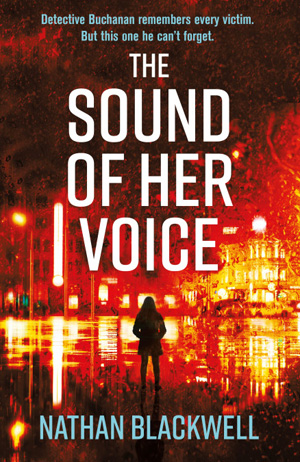
Nathan Blackwell writes quality fiction and is himself a fiction. The author of The Sound of Her Voice, described as “harrowing, compelling, and quite brilliant” (New Zealand Herald) and a double finalist in last year’s Ngaio Marsh Awards, writes under a pseudonym because of his policing past. Blackwell lives in Auckland and spent several years working undercover investigating the most serious crimes as a detective. Now he brings a gritty authenticity as a novelist, and with his highly acclaimed debut being published more broadly this month, and Blackwell appearing at Newcastle Noir, we decided to catch up with the mystery man …
What are crime fiction lovers going to love about The Sound of Her Voice?
The book is an accurate portrayal of the work a detective does, not the glamorous, fast-paced, going-with-the-gut shows you see on TV. It’s often laborious, gritty, painstaking work. If readers are interested in what it’s actually like, then this is the story for them. The plot is intentionally dark – too much realism often equals boredom – so to keep things interesting the story takes a very dark turn. On top of all that, and leaking through, the story is very Kiwi. The places, the characters, the humour – all show off a little piece of New Zealand that hopefully rings true with people who know the place and will interest others in having a look.

Having worked for a decade in the New Zealand Police, what inspired you to switch lanes and write a crime novel?
I didn’t switch lanes exactly at the start. I’d always considered writing a novel but it was a fantasy really, I never thought I’d be able to pull a story together. I wrote fragments over a few years while I was still in the police. It was something borne out of watching and reading cop stories that didn’t ring true for me – they were great stories, great escapism, but glamorised the job in many ways. I wanted to get some truth across. But it wasn’t until a good friend and work colleague of mine, Simon Wyatt, wrote his novel The Student Body that I developed some self-belief, and actually began writing the story seriously.
How much is Detective Matt Buchanan based on your own experiences in the police, and those of your colleagues?
Matt Buchanan is a composite of many parts. Some of them are me, for sure, and others I’ve seen in colleagues, most definitely. But I had a plan for Matt from the start and to explain where he ends up I needed to have a lot of terrible things happen to him. The character ended up developing in a natural way, and the spanning of time in the story (more than two decades, from 1995 through until around 2018) helped largely. The human side of Matt is realistic, but real cops are better at not letting their own thoughts and opinions dictate their actions. But the things that happen to Matt – the things that affect him – certainly happen to officers on an almost daily basis.
You take readers into some dark places. How important was it for you to show readers the reality of police work, warts and all?
Very. Showing the reality was probably the main aim, although keeping a reader interested enough to actually keep reading wasn’t too far behind! Those two things drive the plot – I wasn’t too concerned about writing for a wide audience, or keeping everyone happy. I wanted to tell a specific story, and if that ended up only being of interest to a tiny group of people, then so be it. I wanted to show that cops are human. They aren’t superheroes, and they aren’t robots. They’re like everyone else, with very similar thoughts and feelings. I wanted to show that human side rather than the broad-brush, they’re-all-the-same portrayal in lots of media. Why do good people do bad things? Can bad people do good things? I was keen to explore all of this, and a crime fiction piece was the obvious medium.
What were some of the biggest lessons you learned during the writing of The Sound of Her Voice?
That anyone can learn to write. I’m no literary genius, I barely scraped through Year 11 English. My favourite stories have pictures in them. But everyone has lived, and everyone thinks. There are plenty of stories to tell. For me, I found developing Matt’s character to be the biggest lesson… once I knew who he was, those elements of the plot I was struggling with worked themselves out. If you know your character, the plot moves forward. I’d say, ‘what would Matt do here?’ And it would be obvious. I think writing a novel is built up to be this really tremendous thing, but really you just need a bit of time, and an idea for a character. The rest will come.
You self-published your debut in New Zealand, then saw it gain tremendous reviews, become a double finalist for the Ngaio Marsh Awards, and get picked up for global publication by Orion. What has that journey been like for you, and how have your former colleagues responded to your career change?
Unexpected! I watched things in slow motion, with the book getting positive reviews from areas I never thought it’d be seen. To be a finalist at the Ngaios wasn’t something I was prepared for, and I’m still trying to get my head around the fact Orion have picked it up for global release. I don’t think I’ve truly grasped it all yet. As for my former colleagues, the vast majority have no idea who Nathan Blackwell is. The ones that do give me a lot of grief – how could someone like me write a book? I can barely read. And they think they see a bit of Matt Buchanan in me – not his actions or skills but his voice and his one-liners, which I personally find offensive coming from them.
As someone who was a detective before becoming a writer, who are some of the crime writers you enjoy reading the most in terms of their portrayals of police work?
I love reading crime fiction as an escape… into how crime fighting should be, if it really could. Jo Nesbo has created a great character and does darkness well. Ian Rankin does a great job of getting the human elements right – who cares about what, and why. As for nailing police procedure, I feel if you get too real, plot may fail. I struggled with that a bit. But if readers want some more realistic police procedurals there are some great kiwi writers doing just that. Vanda Symon, Simon Wyatt, and Angus Mclean all write about police or former police characters with very accurate detail. Simon used to be a police detective, Angus still is, and Vanda has created a stunningly realistic character in Sam Shephard.
You write under a pseudonym due to past undercover work, and to begin with had your voice disguised in radio interviews. How are you feeling about ‘coming out’ a little more and appearing onstage at the Newcastle Noir festival in early May?
A lot better, for sure. The pseudonym isn’t so much about me personally, as the work of the units I was a small part of. That, and a continued belief in the hard work that everyone employed by the NZ Police churns out daily. Rotorua Noir earlier this year certainly played a part too – it helped me realise I’m comfortable being out and about, but Nathan Blackwell I’ll stay.
Australian and New Zealand crime writing is getting more and more attention in recent years. How does it feel to be part of that growing wave and to see your book being published in the UK and beyond? Who are some of the Kiwi and Aussie authors who’ve had an impact on you?
It’s an overwhelming privilege. I never set out to even finish a story, let alone be published. To have this unfold over the last couple of years the way it has, is pretty humbling, and due entirely to a small number of people who promoted the story within New Zealand, and shared it with the UK. When it comes to local authors – I was always proud of anything written Down Under, ever since I was a kid. John Marsden was an early favourite, and now the likes of Vanda Symon, Paddy Richardson and Paul Cleave are showing me how it’s done.
What’s next for you in crime writing?
Matt Buchanan’s story isn’t over; The Sound of Her Voice is essentially an origin story – turning him into the person he is. And there is plenty more for him to do.
Watch for our review of The Sound of Her Voice soon.










I have just this instant finished reading this most interesting book however I have many friends in the police force ranging from commissioner downwards and each have expressed to me that the language used on most pages is not a good reflection of participants of the force and in fact is a large negative.
Great to know the Commissioner read Nathan’s awesome book, hope he enjoyed it like the rest of us 🙂